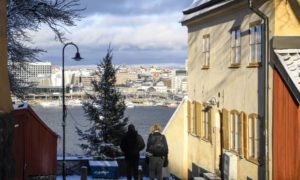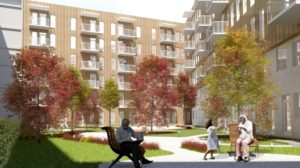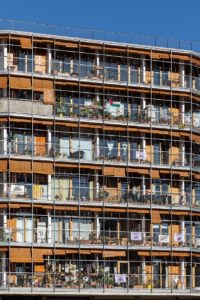This Week in the News – February 14th, 2022
Caught in the Rental Trap Trying to Turn Flat into a Co-op (UK)
 This kind of homeownership is a sustainable solution to the housing crisis – but it’s not easy in today’s property market.
This kind of homeownership is a sustainable solution to the housing crisis – but it’s not easy in today’s property market.
Ruby’s home, like many people’s, is a place of solace and comfort. It’s somewhere they’ve worked through the end of a long-term relationship, hosted parties, waged an ongoing war with a squirrel in their garden and housed their extensive condiment collection. Despite their emotional ties to this place, they do not own it. Like millions of other renters in the UK, that puts Ruby in a permanently precarious situation. They are at the behest of a landlord, who can evict them for no reason, at any time.
In this state of uncertainty, you can be reminded of your powerlessness at any moment. That moment came for Ruby and their housemates towards the end of last year, when they found out that their landlords were considering selling. So what did three young professionals with no rich benefactors but an unusually large understanding of housing policy do? They decided to try to turn their house into a cooperative.
Click here to read more about Ruby’s experience.
New Social Housing Project Aims to Transform Montreal’s Outremont Borough (Canada)
 Since 2017, the founding members of the MIL Coop have been working hard to establish a multigenerational housing cooperative in Montreal, Canada. The co-op will allow dozens of young families and single people to settle or remain in the city. It is a great example of a vision for mixed-use, more inclusive neighbourhoods.
Since 2017, the founding members of the MIL Coop have been working hard to establish a multigenerational housing cooperative in Montreal, Canada. The co-op will allow dozens of young families and single people to settle or remain in the city. It is a great example of a vision for mixed-use, more inclusive neighbourhoods.
Click here to learn more.
EU Mies Award Finalist: Lacol’s La Borda Cooperative Housing (Spain)
 Congrats to Lacol Architecture Cooperative for being an EU Mies Award finalist for the Emerging Architecture category for their work on La Borda Cooperative Housing in Barcelona, Spain. Community-minded design is at the heart of La Borda; by designing for a known community rather than an unknown end-user the cooperative was able to produce a socially sustainable housing model.
Congrats to Lacol Architecture Cooperative for being an EU Mies Award finalist for the Emerging Architecture category for their work on La Borda Cooperative Housing in Barcelona, Spain. Community-minded design is at the heart of La Borda; by designing for a known community rather than an unknown end-user the cooperative was able to produce a socially sustainable housing model.
The building also includes various design and material choices aimed towards reducing the carbon footprint of this project. They highlight different characteristics of the project which we believe help it to stand apart in the wider context of collective housing: self-development, grant-of-use, community living, sustainability, affordability, and flexibility and adaptability.
Click here to learn more.

